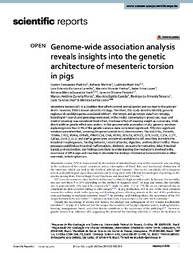Embrapa Pecuária Sudeste
 Busca de Publicações
Busca de Publicações
Genome-wide association analysis reveals insights into the genetic architecture of mesenteric torsion in pigs.
Autoria: PADILHA, S. F.; MARTINS, R.; HUL, L. M.; CARREÑO, L. O. D.; FREITAS, M. S. de; LOPES, J. S.; IBELLI, A. M. G.; PEIXOTO, J. de O.; MORES, M. A. Z.; CANTAO, M. E.; TEIXEIRA, R. de A.; DIAS, L. T.; LEDUR, M. C.
Resumo: Mesenteric torsion (MT) is a condition that affects several animal species and can lead to the animals’ death. However, little is known about its etiology. Therefore, this study aimed to identify genomic regions and candidate genes associated with MT. Phenotypic and genotypic data from 405 pigs, including MT records and genealogy were used. In the model, contemporary group (sex, year, and week of weaning) was considered fixed effect, the linear effect of weaning weight as a covariate, while direct additive genetic effect was random. In the genome-wide association study, genomic windows explaining more than 0.3% of the genetic variance were considered significant. Fifty-two significant windows were identified, covering 299 genes located on 15 chromosomes. The HSD17B4, TNFAIP8, TENM4, CHD2, RGMA, OPRM1, PPARGC1A, CHIA, KCNJ2, KCNJ16, KCNJ15, ELN, SGO1, IL17A, IL17F, GATA4, OVOL2, GLI3, and RAP1A genes were considered candidates to MT since they are related to intestinal morphogenesis, feeding behavior, intestinal barrier, digestion, and intestinal motility. These processes could induce intestinal malformations, dysbiosis, excessive fermentation, delay intestinal transit, and obstruction. Our findings contribute to understanding the mechanisms involved in the occurrence of MT in pigs and may help to elucidate the etiology of intestinal torsion/volvulus in other mammals, including humans.
Ano de publicação: 2025
Tipo de publicação: Artigo de periódico
Unidade: Embrapa Pecuária Sudeste
Palavras-chave: Death, Finishing, Genoma, Genética Animal, Nervous system, Porco, Secretion, Volvulus

